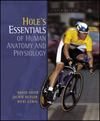

 Hole's Essentials of Human Anatomy & Physiology, 8/e Endocrine System Chapter Quiz |
 2003 McGraw-Hill Higher Education
2003 McGraw-Hill Higher EducationAny use is subject to the Terms of Use and Privacy Notice.
McGraw-Hill Higher Education is one of the many fine businesses of The McGraw-Hill Companies.